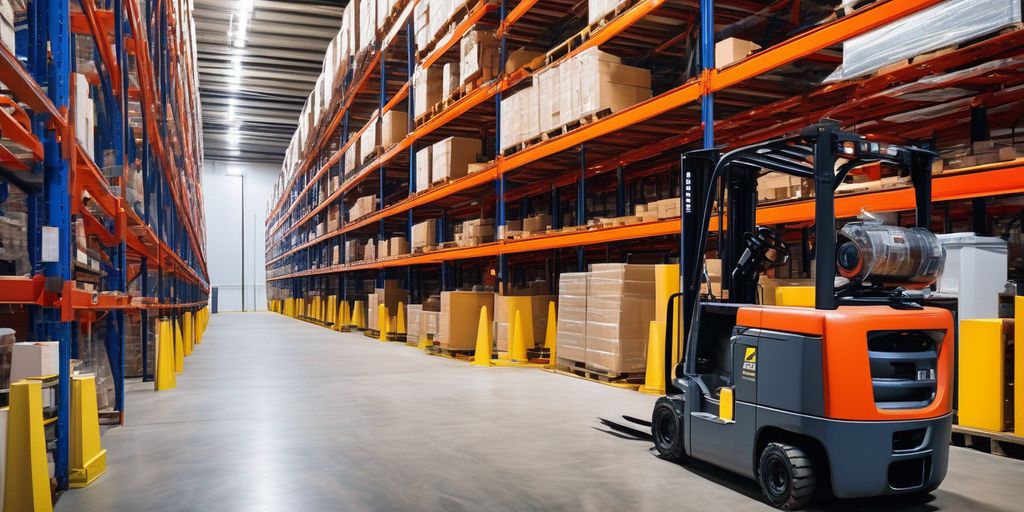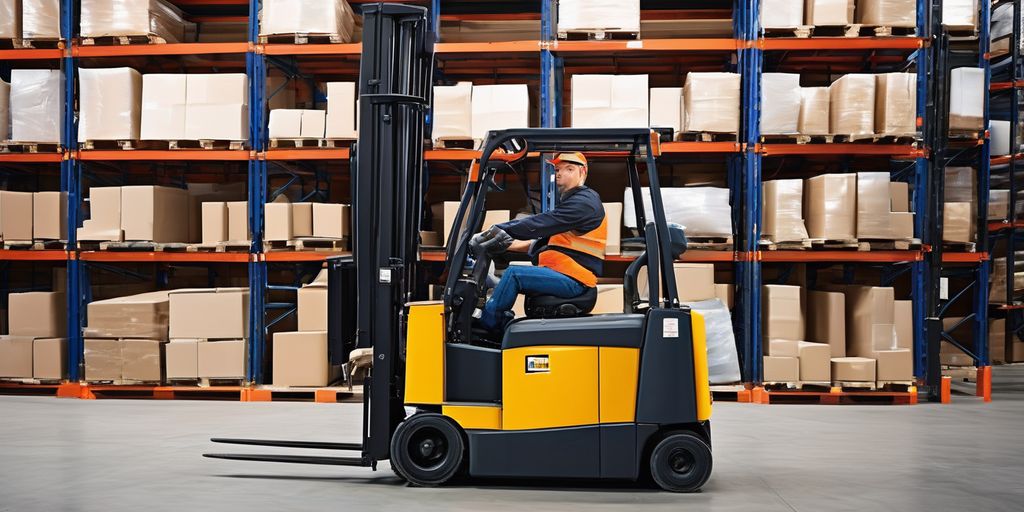Maximizing Warehouse Efficiency with Forklift Fleet Management — overview
In today's fast-paced logistics and warehouse environments, effective management of forklift fleets is crucial for maximizing operational efficiency and productivity. This article explores various strategies to optimize the management and operation of forklift fleets, from fleet composition to technology integration, aiming to enhance overall warehouse performance.
Key Takeaways
- Implementing real-time communication and optimal routing can significantly boost forklift operational efficiency.
- Regular maintenance and strategic upgrades extend the lifespan and reliability of forklift fleets.
- Advanced training programs for operators and the use of technology in task management are vital for enhancing productivity.
- Strategic fleet management reduces operational expenses and improves asset utilization across the warehouse.
- Future trends like the adoption of autonomous forklifts and integration with IoT will revolutionize fleet management.
Strategies for Optimizing Forklift Fleet Management

Assessing Fleet Size and Composition
To ensure optimal performance and cost efficiency, it's crucial to assess the size and composition of your forklift fleet. Regular analysis of operational requirements helps determine the appropriate number of forklifts, which can prevent both shortages and costly surpluses.
Implementing Real-Time Communication Systems
Integrating real-time communication systems enhances coordination among operators, leading to improved response times and operational efficiency. This system allows for immediate updates and adjustments, which are essential in a dynamic warehouse environment.
Regular Maintenance and Upgrades
Maintaining forklifts in top condition is vital for operational efficiency. Scheduled maintenance and timely upgrades can significantly reduce downtime and extend the lifespan of the equipment. Implementing a structured maintenance program is a key step in fleet management.
By focusing on these strategic areas, businesses can enhance the efficiency and reliability of their forklift fleets, leading to better overall performance and reduced operational costs.
Enhancing Productivity Through Efficient Forklift Operations

Optimal Route Planning for Forklifts
To maximize warehouse operations, optimal route planning is crucial. It ensures that forklifts travel the shortest and safest routes, reducing unnecessary movements and saving time. Implementing advanced routing software can help streamline this process, leading to smoother and more efficient operations.
Training Programs for Operators
Effective training programs are essential for enhancing forklift operator skills and safety. Comprehensive training covers operational techniques, safety protocols, and maintenance knowledge, which are critical for optimizing productivity and minimizing accidents.
Leveraging Technology for Task Management
By leveraging technology, warehouses can significantly improve task management. Real-time tracking systems and automated task assignments help in coordinating forklift activities, ensuring that every move is calculated and contributes to overall efficiency. This integration of technology not only boosts productivity but also enhances the accuracy of inventory management.
Blockquote: Emphasizing the integration of technology in forklift operations can lead to significant gains in productivity and operational efficiency.
Impact of Forklift Management on Supply Chain Reliability

Minimizing Disruptions
Proper management of forklift fleets is crucial in minimizing disruptions to the supply chain. Effective fleet management ensures that forklifts are available and operational when needed, thus maintaining continuous workflow and preventing delays in warehouse operations.
Improving Delivery Timeliness
Ensuring that forklifts are efficiently managed leads to more predictable and timely deliveries. Streamlined operations allow for faster transport and handling of goods, which is essential for meeting tight deadlines and maintaining customer satisfaction.
Enhancing Inventory Accuracy
Accurate inventory management is significantly supported by well-managed forklift operations. Improved visibility and tracking of inventory through advanced fleet management systems contribute to enhanced warehouse performance and reduce the likelihood of inventory errors.
Cost Savings via Strategic Forklift Usage

Reducing Operational Expenses
By optimizing forklift usage, businesses can achieve significant cost-saving benefits. Key areas of savings include reduced maintenance costs and lower fuel consumption. Efficiently scheduling forklift operations can help reduce fuel consumption and overall operating costs, leading to substantial financial savings.
Maximizing Asset Utilization
Optimizing the routing and task assignment for forklifts is crucial. By analyzing work schedules, load sizes, and travel distances, businesses can create more efficient routes for forklift operators. This reduces unnecessary travel time and improves overall productivity, maximizing asset utilization.
Lifecycle Management of Forklifts
Proactive management of forklift usage extends the lifespan of equipment and minimizes repair expenses. Additionally, adopting technologies like lithium-ion powered forklifts can transform operations by cutting costs and reducing emissions. This strategic approach not only saves money but also boosts productivity.
By focusing on strategic forklift usage, businesses can enhance productivity and achieve significant cost reductions.
Best Practices for Forklift Fleet Optimization

Data-Driven Decision Making
To ensure optimal performance and efficiency, utilize data analytics to monitor and analyze forklift operations. This approach helps in identifying patterns, predicting maintenance needs, and optimizing resource allocation.
Safety and Compliance Standards
Adhering to safety and compliance standards is crucial for minimizing risks and ensuring smooth operations. Implement regular training sessions and safety audits to maintain high safety standards.
Environmental Considerations
Focus on reducing the environmental impact of forklift operations by adopting cleaner technologies and improving fuel efficiency. Consider the integration of electric or hybrid models to decrease emissions and enhance sustainability.
Emphasizing these best practices not only enhances operational efficiency but also contributes to a safer and more sustainable working environment.
Future Trends in Forklift Fleet Management

Adoption of Autonomous Forklifts
The shift towards autonomous forklifts is set to revolutionize warehouse operations. These self-driving forklifts can operate without direct human intervention, enhancing safety and efficiency. They are programmed to navigate through warehouses with precision, reducing the risk of accidents and improving overall workflow.
Integration with IoT and AI
Integrating forklift operations with the Internet of Things (IoT) and Artificial Intelligence (AI) allows for real-time data analysis and decision-making. This technology enables predictive maintenance, which can prolong forklift battery life and minimize downtime. Fleet managers can monitor forklifts remotely, optimizing routes and schedules based on immediate data insights.
Sustainability Initiatives
Environmental considerations are becoming crucial in fleet management. Initiatives like electric forklifts and energy-efficient practices are being adopted to reduce the carbon footprint. This not only supports global sustainability efforts but also aligns with increasing regulatory demands for greener operations.
Embracing these future trends will be essential for businesses looking to stay competitive and efficient in an evolving industrial landscape.
Conclusion
In conclusion, effectively managing a forklift fleet is crucial for maximizing warehouse efficiency. By implementing a robust fleet management system, maintaining forklifts regularly, and ensuring proper training for operators, warehouses can significantly enhance productivity and extend the lifespan of their assets. Strategic optimization of forklift operations not only supports smoother internal workflows but also contributes to substantial cost savings. As demands on warehouses continue to grow, adopting these best practices in forklift fleet management becomes indispensable for staying competitive and meeting operational goals efficiently.
Frequently Asked Questions
What are the key benefits of implementing a forklift fleet management system?
Implementing a forklift fleet management system enhances communication, increases productivity, and extends the asset life of the forklifts, ensuring that operations are efficient and cohesive.
How can warehouse space utilization be optimized using forklifts?
Optimizing warehouse space involves strategic route planning to minimize forklift travel and smart placement of goods, which can be achieved through advanced warehouse software and best practices in fleet management.
What are some cost-saving strategies for forklift usage?
Cost-saving strategies include optimizing fleet utilization to avoid unnecessary expenses, regular maintenance to extend forklift life, and training operators to ensure efficient operation.
How does forklift fleet management improve supply chain reliability?
Proper management of the forklift fleet minimizes disruptions, enhances delivery timeliness, and improves inventory accuracy, thereby supporting a more reliable supply chain.
What are the best practices for maintaining an efficient forklift fleet?
Best practices include regular maintenance, data-driven management, adherence to safety and compliance standards, and implementing technological solutions like IoT for real-time monitoring.
What future trends are shaping forklift fleet management?
Future trends include the adoption of autonomous forklifts, integration with IoT and AI technologies, and increased focus on sustainability initiatives to enhance efficiency and reduce environmental impact.




Leave a comment
This site is protected by hCaptcha and the hCaptcha Privacy Policy and Terms of Service apply.